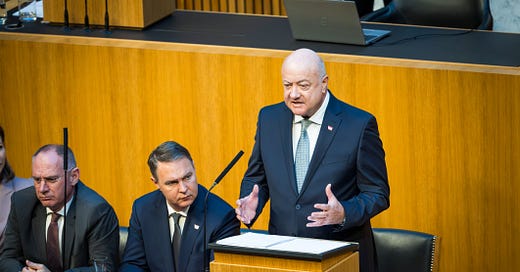New Agenda
What Austria's new three-party government plans to do to consolidate the country's budget and reform its immigration and asylum system
Servus!
One more question—one which required a longer response: “I would be interested in learning more about key programmatic issues for Austria’s new government, including its positions regarding relationships with the USA, Europe, Russia/Ukraine, China, etc. and its status as a small, neutral country. Does the new government see a larger international role for Austria or are they more focused on internal issues?” In other words: What is the new government’s agenda?
Two weeks ago, Austria’s new government was sworn in by President Alexander Van der Bellen. The coalition of the conservative People’s Party (ÖVP), Social Democratic Party (SPÖ), and liberal NEOS is led by Christian Stocker—Wiener Neustadt’s former deputy mayor and now Austria’s accidental chancellor—and is the country’s first three-party government at the federal level since 1947. After much negotiation, here’s how the three parties ended up dividing ministries and portfolios between them:
ÖVP: Chancellor; economy, energy, and tourism; interior1; family, youth, Europe and integration; defense; agriculture, climate protection, the regions, and water, constitution, civil service and digitization.
SPÖ: Vice chancellor; innovation, transport and infrastructure; women, higher education and research; finance2; work, social, healthcare, social care and consumer protection; justice; housing, art, culture, media and sport.
NEOS: Foreign affairs; education; deregulation.
Circumstances dictate that the new government’s immediate focus will be bringing Austria’s budget deficit back down to below 3 percent of GDP as necessitated by the European Union’s Maastricht criteria. The coalition plans to save €6.3 billion in 2025 and a further €2.4 billion in 2026 and write a two-year budget to that end. Among the measures already agreed, as I wrote to you in a previous edition of the newsletter, include the elimination of Bildungskarenz and the Klimabonus, ministerial departmental budget freezes for operational costs, and higher levies on energy companies’ and banks’ profits.
The government’s fate will be determined by whether it can successfully implement these plans and consolidate Austria’s budget at the same time as it tries to bring in other important domestic reforms. These include a partial pension option for people over the age of retirement who plan to work longer, new nationally applicable rules on entitlements, and an expansion of primary care via new primary care centers and greater use of telemedicine. Due in part to the rise of the far-right Freedom Party (FPÖ), a particular area of focus will be immigration and integration: a compulsory ‘integration program’ for asylum seekers that will begin on their arrival in Austria, a headscarf ban for young girls, and an immediate halt to family reunification for asylum seekers.
As for foreign policy, the coalition’s focus is not so much on Austria’s relationships with major powers like the USA3 and China as the country’s role in Europe and other international institutions as permitted by Austria’s permanent constitutional neutrality. The government plans to bid for a seat on the UN Security Council in 2027/28 and the chairmanships of the OSCE and UN Human Rights Council. It also continues to see a role for Austria as a mediator in international affairs and Vienna as a seat for international institutions and conferences, though I do not foresee Austria playing a particular role in forthcoming talks between the United States and Russia regarding an end to the Russo-Ukraine War4.
In Brussels, the coalition will push for the countries of the Western Balkans joining the EU, support a “European path” for Ukraine, Moldova, and Georgia, and demand a formal end to accession talks with Turkey. Austria will continue to participate in humanitarian aid for Ukraine, though expect no change in policy concerning military aid. The new government also wants the EU to reform its institutions, deregulate its single market, and develop common markets for raw materials, energy, and capital markets. With the NEOS in control of the foreign ministry, Austria will certainly be among those member states pushing the EU to strengthen its strategic autonomy in the changing, volatile international environment.
Bis bald!
Thank you for reading The Vienna Briefing. Nothing beats a personal recommendation; if you know someone who would be interested in reading this newsletter, consider sharing it with them today.
The Vienna Briefing is a reader-supported publication. Your one-time or monthly tips make my work on this newsletter possible and help keep The Vienna Briefing free for everyone.
Meinl-Reisinger To Kyiv
Austria’s foreign minister Beate Meinl-Reisinger used her second foreign trip to visit Ukraine where she met with president Volodymyr Zelenskyy. She stressed that Ukraine and Europe had to participate in negotiations over an end to the Russo-Ukraine War to ensure a “just and durable peace” in the country.
Game Recognizes Game
The FPÖ wants to strengthen its international contacts with Republicans in the United States, the party’s general secretary has said. Austria’s far-right sees a role for Hungarian prime minister Viktor Orbán and his Fidesz Party as a bridge builder in this exercise.
Run Around Rosenkranz
President of the Austrian Parliament Walter Rosenkranz (FPÖ) may no longer automatically lead the National Fund for the Victims of National Socialism going forward. The new government has amended the law governing the restitution body to say that its board can also be presided over by parliament’s second and third presidents.
In the interior ministry, the SPÖ will be responsible for the security services.
In the finance ministry, the ÖVP will run the customs, exports, securities law, FinTech, finance education, and double taxation agreements portfolio.
The program for government describes the transatlantic relationship as being “of great importance” and a “strategic partnership in the realms of politics, economics, research, and culture.”
As Austrian foreign policy has been subsumed into European foreign policy since 1995, its role as a bridge builder in international affairs has diminished. It was Turkey, for example, that negotiated the Black Sea Grain Initiative in 2022, not Austria.




